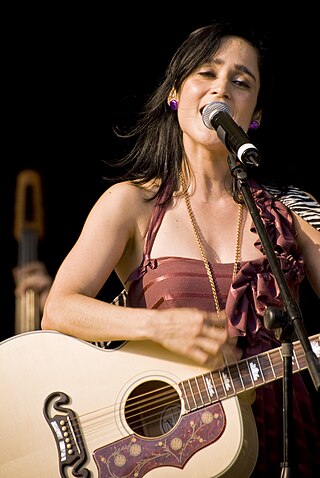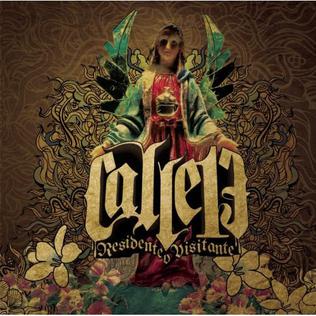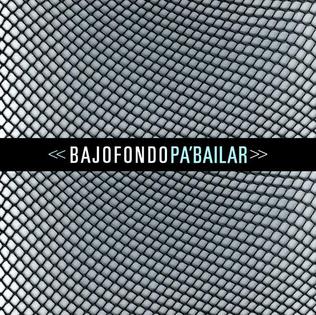
Gustavo Adrián Cerati was an Argentine musician, singer-songwriter, and record producer, who gained international recognition for being the leader, vocalist, composer, and guitarist of the rock band Soda Stereo. He is widely considered by critics, specialized press, and musicians as one of the most important and influential artists of Latin rock. Billboard magazine ranked Cerati as the 33rd best rock singer of all time.

Café Tacuba, stylized as Café Tacvba, is a band from Naucalpan de Juárez, State of Mexico. The group gained popularity in the early 1990s. They were founded in 1989, before they had the current lineup of Rubén Isaac Albarrán Ortega, Emmanuel del Real Díaz, José Alfredo "Joselo" Rangel Arroyo, and Enrique "Quique" Rangel Arroyo, their friend Roberto Silva played the keyboards for a short period of time. Since the Cuatro Caminos World Tour, Luis "El Children" Ledezma has played the drums in every concert but is not considered an official member of the band, as well as Ramiro Del Real Díaz, who joined the band as a support musician playing the guitar since 2015.

Juana Rosario Molina Villafañe is an Argentine singer, songwriter and actress, based in Buenos Aires. She is known for her distinctive sound, considered an exponent of folktronica, although it has also been described as ambient, experimental, neofolk, chill-out, indietronica, psychedelic, indie pop, and progressive folk.

Julieta Venegas Percevault is a Mexican singer, songwriter, instrumentalist, and producer who specializes in pop-rock-indie music in Spanish. She embarked on her musical journey by joining several bands, including the Mexican ska band Tijuana No!. Venegas is proficient in playing 17 instruments, including the acoustic guitar, accordion, and keyboard.

Juan Campodónico, sometimes working under his stage name Campo, is an Uruguayan musician, producer, composer, creator and former member of El Peyote Asesino, Bajofondo and Campo. He produced albums by Jorge Drexler, Luciano Supervielle, Bajofondo, El Cuarteto de Nos, La Vela Puerca, OMAR, Sordromo, No Te Va Gustar, Santullo and Ximena Sariñana among others. He created the Bajofondo project alongside iconic producer and two-time Academy Award winner for Best Original Score Gustavo Santaolalla. He has been awarded with various Latin Grammy, Premios Gardel and Graffiti awards for his work as a producer, as well as with many golden records.

Raúl Alberto Antonio Gieco, better known as León Gieco is an Argentine folk rock performer, composer and interpreter. He is known for mixing popular folkloric genres with Argentine rock, and lyrics with social and political connotations. This has led to him being called "The Argentine Bob Dylan".

Gustavo Alfredo Santaolalla is an Argentine composer and musician. Known for his minimalist approach to composing, he rose to fame for creating the scores for Brokeback Mountain (2005) and Babel (2006), for which he received two Academy Awards for Best Original Score in consecutive years. Santaolalla also gained recognition for his work on The Last of Us game series, composing the 2013 title and its 2020 sequel. He returned to reprise his themes and co-compose the score for the 2023 television adaptation.
Arco Iris were a rock group from the late 1960s until the late 1970s in Argentina, influential in Argentine rock history.

Adriana Varela is an Argentine tango singer, with a successful career that encompasses many records, as well as minor movie roles.
Emilio Kauderer is an Argentine composer, orchestrator and songwriter residing in Los Angeles. He is best known for his scores for films including "Metegol (Underdogs)", "Secret in Their Eyes", and "A Place In the World". Kauderer won a Latin Grammy for his work on Bajofondo's 2002 album "Bajofondo Tango Club".

Residente o Visitante is the second studio album by Puerto Rican urban/hip hop band Calle 13, released on April 24, 2007, by Sony BMG. Recorded in various countries while on tour in promotion of the duo's debut album Calle 13, Residente o Visitante marked an evolution in the band's musical and lyrical style. While writing the album, the duo took a trip to South America to explore areas populated by Latin America's indigenous and African-descended minorities, a journey that greatly influenced the music on Residente o Visitante. The album features six guest artists and delves into genres such as tango, bossa nova, cumbia, and electronica.

"Tango del Pecado" is the first single from Calle 13's second album, Residente o Visitante. The song features Bajofondo & Panasuyo and was released on iTunes via digital download on March 27, 2007.

Bajofondo is a Río de la Plata-based music band consisting of eight musicians from Argentina and Uruguay, which aims to create a more contemporary version of tango and other musical styles of the Río de la Plata region. It was founded in the early 2000s as a studio experiment, which culminated into the successful album Bajofondo Tango Club. This led to touring and eventually to the current lineup. Bajofondo calls itself a collaborative as all members have solo careers as well. The group has toured around the world, particularly in Latin America, the United States, Europe and parts of Asia. Their music is known to a wider audience than those who know their name as their music has been used in film and television.

"Pa' Bailar" is an instrumental neotango song by Bajofondo, and the lead single from their second studio album Mar Dulce. This song features Japanese bandoneonist Ryōta Komatsu. The song is used as the theme of the Brazilian telenovela A Favorita.
"El Mareo" is a song by Argentinian-Uruguayan band Bajofondo featuring vocals by the famous Argentine rock musician Gustavo Cerati. After their successful single "Pa' Bailar" featuring Japanese bandoneonist Ryōta Komatsu and just before starting their tour through North and Latin America, the band decided to make "El Mareo" the second single from 2007s album Mar Dulce. The song was nominated on the 2008 Latin Grammy Awards, as Best Alternative Song.
Érica Laura García Durazzini is an Argentine composer and singer. She was nominated only once in the Latin Grammy Awards of 2000 for Best Female Rock Vocal Performance for her popular tune "Vete Destino" but did not win. While best known as a rock singer, she also sings tango music and jazz. She has worked as a writer, painter, fashion designer and television personality among other creative endeavours. Part of her ancestry can be traced to the Guaraní people.
Gerardo Horacio López von Linden, known professionally as Cachorro López, is an Argentine record producer, musician and songwriter. Born in Buenos Aires, Argentina, he enrolled in various musical ensembles, including Zas and Los Abuelos de la Nada. López has worked with several artists producing their albums, including Caifanes, Stephanie Salas, Andrés Calamaro, Paulina Rubio, Diego Torres and Miranda!. López also was the executive producer of the tribute album for the English band Queen in 1997. His work has been recognized with two Latin Grammy Awards for Producer of the Year in 2006 and 2009, out of four consecutive nominations, and a Grammy Award for producing Limón y Sal by Julieta Venegas.
Rich Isaacson is an international music entrepreneur whose influence spans artists such as Wu-Tang Clan, MIKA, Akon, Gustavo Santaolalla, Charles Bradley, Mobb Deep, Melanie Fiona, SafetySuit, and Three 6 Mafia.
The 23rd Annual Premios Gardel ceremony was held on July 23, 2021, and it was presented with no in-person ceremony due to the COVID-19 pandemic. The television broadcast of the show was in charge of the TNT Latin America, while LRA Radio Nacional provided radio coverage. The ceremony recognized the best recordings, compositions, and artists of the eligibility year, which ran from January 1, 2020 to January 31, 2020. The nominations were announced on May 7, 2021. The ceremony was hosted by television personalities Jey Mammón and Eleonora Pérez Caressi.

Presente is the fourth studio album by the Río de la Plata-based music band Bajofondo released on March 5, 2013, through Sony Music. The album was produced by Bajofondo members, Gustavo Santaolalla and Juan Campodónico, and features arrangements by Alejandro Terán.













